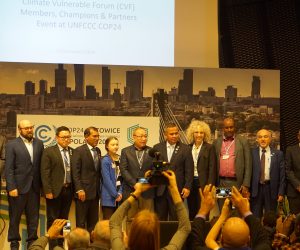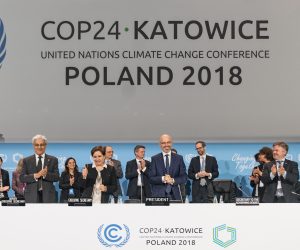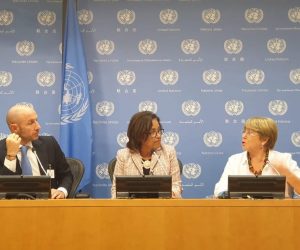
Delegates from the CVF Presidency of Bangladesh moderating the Senior Officials Meeting from Dhaka (Credits: CVF)
Climate vulnerable nations lay out expectations for Glasgow COP26
- Forum of 48 climate vulnerable nations calls on COP26 to set up annual ambition raising platforms to safeguard the 1.5ºC warming limit
- Also demanded is the development of a Delivery Plan to overcome shortfall of promised annual US$100 billion in climate finance in the 2020-2024 period
19 October 2021, DHAKA: Senior government officials from the world’s most climate vulnerable countries met virtually to articulate their priorities for the upcoming UN Climate Change Conference, UNFCCC COP26, setting concrete expectations and spelling out what success – and failure – will look like in Glasgow this November.
Bangladesh, which presides the Climate Vulnerable Forum (CVF), represented by Foreign Minister A.K. Abdul Momen, said that the global meeting of the world’s most climate threatened nations was the final preparatory step of CVF ahead of COP26 and the culmination of a year’s work encompassing four regional ministerials held during 2021.
Chaired by the honorable Foreign and Environment Secretaries of Bangladesh, Ambassador Masud Bin Momen and Md. Mostafa Kamal, Forum members issued a “Senior Officials Meeting Report” from the conference outlining the key deliverables required to keep the planet safe and protect the most vulnerable.
The global officials gathering reiterated the call from Forum Ministers with the “Climate Vulnerables’ Manifesto for COP26”, issued by CVF ministers last month, for the Glasgow conference outcome to include a “Climate Emergency Pact” to restore faith in the Paris Agreement and its implementation.
Speaking at the opening of the meeting, the honorable Bangladesh Environment, Forest and Climate Change Minister, HE Shahab Uddin, for the CVF presidency, commented:
“The alarming findings of the IPCC sixth assessment report has been acknowledged as a ‘code red’ for humanity, showcasing the imminent risk of hitting the 1.5 degrees as early as 2030. As a result, the need to deliver the ‘Climate Emergency Pact’ that is undertaken by the CVF is of paramount urgency.”
The Pact would include a Delivery Plan for the annual US$100 billion in climate finance for developing countries for the 5-year period 2020-2024 with a balanced, 50/50 split, of funds between adaptation and mitigation and independent annual monitoring of implementation involving the International Monetary Fund (IMF).
“Climate finance commitments are going unmet. There is a shortfall to the $100 billion and a total imbalance in funding with completely insufficient resources for adaptation,” said Bangladesh Environment Secretary Mostafa Kamal commenting on the need for a Delivery Plan to rebuild confidence that promised climate finance would genuinely materialize as agreed in the UN.
Under the “Climate Emergency Pact”, CVF members are also asking for annual ambition raising platforms to ensure the possibility of fulfilling the 1.5ºC goal enshrined in the Paris Agreement, which requires far greater emissions cuts than those pledged prior to 2030. The Forum called for mandating such platforms for every single COP until 2025 to urge all governments, but especially major emitting countries, to come forward with new ambition on adaptation and mitigation that goes above their current national emission (“NDCs”[*]) or adaptation targets.
CVF Troika member and Ethiopia Commissioner for Environment, Forest and Climate Change, HE Prof. Fekadu Beyene, speaking at the global Forum meeting commented:
“What we have learned from the IPCC’s latest report is that 1.5 is upon us within this decade: by 2030. Accordingly, the major emitters are so far off-track from 1.5 degrees, that we can no longer rely only on the 5-year mechanism of the Paris Agreement,” adding that “we are calling on any country but especially the major emitters to come with additional ambition at every single COP. This is the only measure that could give the vulnerable nations hope to keep 1.5 within reach. Additionally, we have a battle on two fronts and we need to constantly also accelerate adaptation action to keep us safe.”
Other priorities spelt out in the Report include a stronger focus and the mandating of work to develop financing options for loss and damage as well as the finalization of robust carbon market mechanisms in line with the 1.5ºC goal and the allocation of at least 5% of proceeds for adaptation financing.
Overall, CVF officials emphasized the “make-or-break” nature of Glasgow’s COP26 to set the world on track for limiting warming to 1.5ºC – a matter of survival for the world’s most vulnerable. At COP26, they said, world leaders will need to demonstrate that the Paris Agreement is still alive: this is a unique opportunity to take the strong and decisive action needed to limit the increasingly devastating impacts of climate change.
Bangladesh Foreign Secretary Ambassador Bin Momen further commented that:
“We are just days away from COP26 now. As the world’s most climate vulnerable nations, the upcoming COP26 is our best hope to bring global attention to our causes. As the first COP in two years, and one hosted by a G7 nation, it is also a major opportunity for us to make substantial progress on better implementing the Paris Climate Agreement.”
Members of the Climate Vulnerable Forum will take their demands to Glasgow in the form of a “Dhaka-Glasgow Declaration of the CVF” to be adopted by the Leaders of the Forum at a dedicated CVF High-Level Meeting during the World Leaders Summit at COP26 in November 2021 that will be presided over by HE Sheikh Hasina, the honourable Prime Minister of Bangladesh and Chair of the CVF.
CVF Managing Partner, the Global Center on Adaptation’s CEO Prof. Dr. Patrick Verkooijen, speaking at the CVF event highlighted partnership opportunities on adaptation, specifically presenting the Africa Adaptation Acceleration Program (AAAP) as a template for bold adaptation action in all regions, in addition to the pathbreaking “Agriculture Innovation Mission for Climate” (AIM for Climate) which is designed to increase and accelerate agriculture and food systems innovation in support of climate action. A number of CVF members are already engaged in both AAAP and AIM for Climate and Prof. Verkooijen exchanged with the CVF senior officials on the GCA’s continued support for engaging with these and other solutions-focused initiatives.
The global Senior Officials Meeting of the Forum which closed today also confirmed that its session in Glasgow will additionally serve to confirm new member states into the CVF, which currently numbers 48 countries.
ENDS
About the CVF
The CVF is an international forum for countries most threatened by climate change. Founded in 2009, it is composed of 48 members across five regions including Africa, Asia, the Caribbean, Latin America and the Pacific, and represents some 1.2 billion people worldwide. The Forum is led by a rotating chair for an ordinary period of two years, with Bangladesh currently chairing for the second time for the period 2020-2022. For more, visit: https://www.thecvf.org/about/
CVF Members
Afghanistan, Bangladesh, Barbados, Bhutan, Burkina Faso, Cambodia, Colombia, Comoros, Costa Rica, Democratic Republic of the Congo, Dominican Republic, Ethiopia, Fiji, The Gambia, Ghana, Grenada, Guatemala, Haiti, Honduras, Kenya, Kiribati, Lebanon, Madagascar, Malawi, Maldives, Marshall Islands, Mongolia, Morocco, Nepal, Niger, Palau, Palestine, Papua New Guinea, Philippines, Rwanda, Saint Lucia, Samoa, Senegal, South Sudan, Sri Lanka, Sudan, Tanzania, Timor-Leste, Tunisia, Tuvalu, Vanuatu, Viet Nam and Yemen.
Contact
Mr. Paul Roberts [email protected] +94 76 577 1421
Mr. Kelvin Anthony [email protected] +61 433 686 217
[*] NDC: Paris Agreement nationally determined contribution




